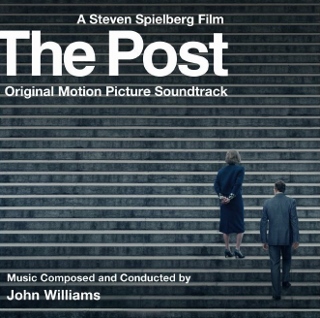FALTERED AT HIS POST
The best thing I can say about John Williams’ score to The Post is that I don’t remember a thing about it after watching the movie, which means it supported the mood perfectly. Recently released on Sony Classical, the CD of the score is an entirely different matter — not that it is something to be remembered, but that it remains just as forgettable, even after three listens.
Taking place over a few days in 1971, the good but unnecessarily agenda-driven film concerns The Washington Post’s editor (Tom Hanks) and owner (Meryl Streep). Their major competitor, The New York Times, goes public with classified military documents that showed the U.S. Government had been lying for decades about its involvement in the Vietnam War (“The Pentagon Papers”). This infuriated President Nixon who successfully sought a court injunction to prevent any further release of the leaked information until it could be settled in the Supreme Court. Will the Post, which came into possession of the same papers, keep silent or inform the public and risk lawsuit or even imprisonment?
It’s as if director Steven Spielberg instructed his longtime composer (this is their 28th collaboration) with: “I need mysterious here. I need tender here. I need pulsing espionage here. I need cocktail lounge here.” With little sense of place or character — other than sounding like the film’s era of over-produced 70s’ episodic TV — the score is a melody-free series of cliches. As if to suggest the emergence of the ubiquitous use of electronic instruments, Williams begins the first of ten tracks (“The Papers”) with cool electronic thumping that reads as pure spy thriller, leading into “The Presses Roll,” which is driving, pummeling, chugging, sweeping… and positively unmemorable (early on, it seems criminal that the album is not worth revisiting given how well-produced the endeavor is).
Whether it’s a meandering movement of lush strings (“Nixon’s Order”) or beautiful, reflective piano accompanied by bittersweet horns and sweet strings (“Mother and Daughter”), the score is simply too bereft of themes — so it’s back to the driving, pummeling, and chugging (“Setting the Type”). There’s pastiche cocktail music (“Two Martini Lunch”) that is lovely tinkering which wants to be a standard when it grows up, and the smart bluesy combo with Randy Kerber on piano (“The Oak Room, 1971”) is intriguing but ends at one minute, thirty-nine seconds — it’s lovely atmosphere, but barely enough time to take two bites of an appetizer.
The most interesting work comes near the end of this 40-minute release when the sounds of ardent Americana, jejune justice, and pervading prosaic patriotism swell into a sea of musical tropes that never catches fire. With more than 100 films under his baton, it’s likely to happen — and completely forgivable — that we occasionally get Williams the machine and not the artist.
The Post
John Williams, composer
Sony Classical
10 tracks | 40:13
released January 12, 2018
available at Amazon and iTunes

